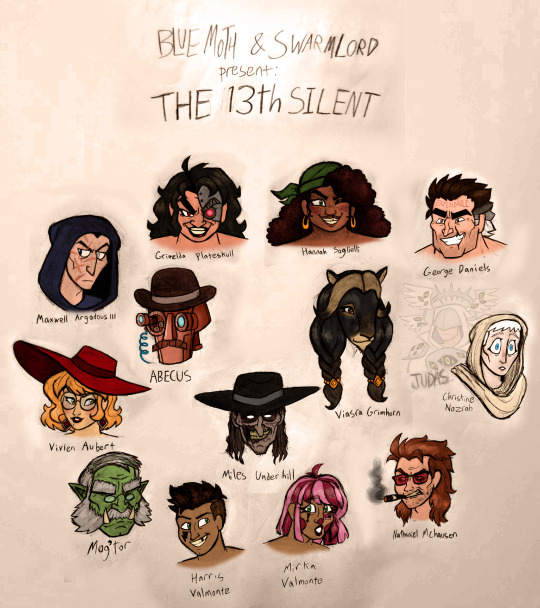Don't wanna be here? Send us removal request.
Text










weeks 11-20 on my weekly poster challenge this year, crazy I've actually managed almost half a year of getting these done. 1-10 here.
27K notes
·
View notes
Text

Ulgaria may be a dark world, but there is always a light in the darkness.
Born from the mind of Maxwell Argadous the 13th Silent started with the mans wish for vigilante justice. He soon recruited people he knew, the first two members being George Daniels and Nathaniel McHausen a hardened soldier and a drunkard stealth agent selling his services.
The three had vastly different personalities, but they soon discovered how when they worked together they achieved great things. When they needed knowledge they went to an orcish professor called Mog'tor who soon became a member of the group himself.
From there the other members were recruited, some randomly, some out of need. The group created for vigilante justice soon became a group of adventuring heroes, daring explorers who went through the many frontiers of Dalkenshir city and the nations of the world spreading hope where they went.
They named themselves the 13th Silent, a name conceived by George, 13th for they seemed unlucky many times and Silent because they were unsung heroes.
Want to know more about them? Feel free to ask any questions!
5 notes
·
View notes
Text

Reblong to give someone an ice cream sanditch.
158K notes
·
View notes
Text
Love you darling
Art for my boyfriend ALSO I GOT A BOYFRIEND @swarmlord1231

18 notes
·
View notes
Text
A basic intro to Ulgaria
Ulgaria is a Fantasy setting
Ulgaria is about mortals surviving in a dangerous world and seeking to reforge it in their vision
Ulgaria features many fantasy tropes, it's a huge fantasy kitchen sink
Ulgarias story is to be told through short stories, most standalone, some leading up to a bigger plot and narrative arc
Nations of Ulgaria are stuck in different developmental phases, so you have generic feudal kingdoms along with kingdoms where warriors make use of fire-arms like revolvers, rifles and even grenade launchers.
Ulgarias main region is inspired by the Mediterranean, the main city where most of the action would take place is called Dalkenshir.
The main threats include the different bickering nations of course AND eldritch horrors imprisoned by the Titans, slowly trying to make their way back to Ulgaria to claim what they view as rightfully theirs.
7 notes
·
View notes
Text
#Please give me the power!
Reblog the writers’ fortune cookie for luck!

279K notes
·
View notes
Text
#I feel nothing but horror

I regret to inform you all that as of this commission I have officially "Made It."
Merry Christmas, Murrlogic
39K notes
·
View notes
Text
#this post is literally me
every artist ever : woops I've hallucinated this thing in such excruciating details I now can't put it down on paper satisfactorily
9K notes
·
View notes
Text
Some tips for using a few words to describe voices:
1. Tone Words: Use tone words to convey the emotional quality of a voice. For example, you can describe a voice as "melodic," "soothing," "sharp," "gentle," or "commanding" to give readers a sense of the tone.
2. Pitch and Range: Mention the pitch and range of the voice. Is it "deep," "high-pitched," "raspy," or "full-bodied"? This can provide insight into the character's age, gender, or emotional state.
3. Accent and Diction: Describe the character's accent or diction briefly to give a sense of their background or cultural influences. For instance, "British-accented," "Southern drawl," or "formal."
4. Volume: Mention the volume of the voice, whether it's "whispering," "booming," "murmuring," or "hushed."
5. Quality: Use terms like "velvet," "silken," "gravelly," "honeyed," or "crisp" to convey the texture or quality of the voice.
6. Rate of Speech: Describe how fast or slow the character speaks, using words like "rapid," "slurred," "measured," or "rambling."
7. Mood or Emotion: Indicate the mood or emotion carried by the voice. For example, a "quivering" voice may convey fear or anxiety, while a "warm" voice may express comfort and reassurance.
8. Resonance: Describe the resonance of the voice, such as "echoing," "nasal," "booming," or "tinny."
9. Timbre: Mention the timbre of the voice, using words like "rich," "thin," "clear," or "smoky."
10. Cadence: Highlight the rhythm or cadence of speech with descriptors like "staccato," "lilting," "rhythmic," or "halting."
11. Intonation: Convey the character's intonation by saying their voice is "sarcastic," "apologetic," "confident," or "questioning."
12. Vocal Characteristics: If applicable, mention unique vocal characteristics, like a "lisp," "stutter," "drawl," or "accented 'r'."
24K notes
·
View notes

